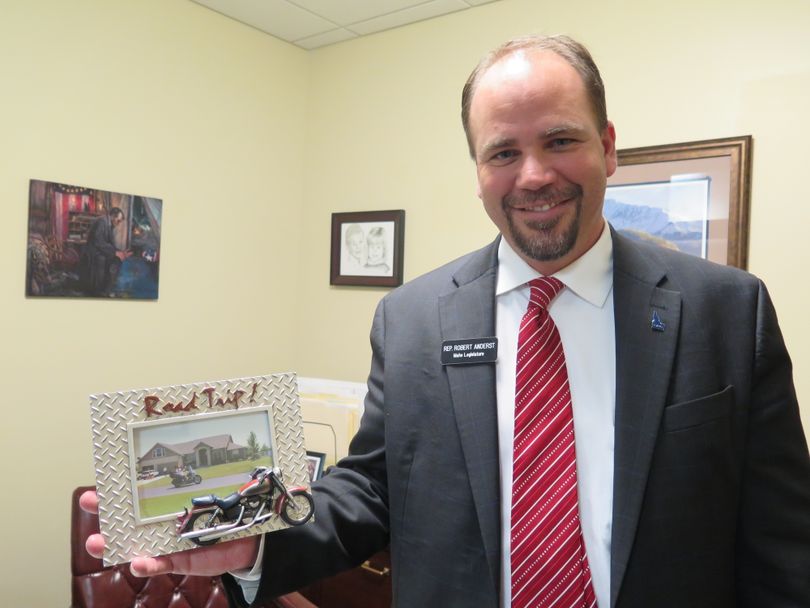Idaho bill would define, ban ‘motorcycle profiling’

Every year, leather-clad motorcyclists come to the Capitol to lobby for motorcycle rights, including a bill to forbid “motorcycle profiling” – and this year, the measure’s been introduced. Rep. Robert Anderst, R-Nampa, said legislation already has passed in Washington and in Maryland; his bill doesn’t go as far, because it doesn’t require law enforcement agencies to change any of their written policies or do specific education efforts aimed at officers. It would, however, define “motorcycle profiling” – and forbid any state or local law enforcement agency from engaging in it.
The definition: “Motorcycle profiling means the arbitrary use of the fact that a person rides a motorcycle or wears motorcycle-related paraphernalia as a factor in deciding to stop and question, take enforcement action, arrest or search a person or vehicle.”
“It’s a fine balance,” Anderst said. “These guys, they really respect the job that law enforcement has to do, but they also believe they don’t deserve any more or any less scrutiny than anyone else.” ABATE of Idaho – an acronym that various chapters in the state say stands for “American Bikers Aiming Toward Education” or “A Brotherhood Against Totalitarian Enactments,” has acquired plenty of examples, Anderst said, of motorcyclists stopped for lengthy questioning and searches.
“For citizens to consistently come down to the Capitol three, four years in a row with a very simple and clear message … tells me that whether law enforcement wants to admit that there’s a problem or not, in their mind, there’s a perception that it’s a problem,” Anderst said. He said ABATE tells him that after Washington passed its motorcycle profiling bill in 2011, complaints dropped by 90 percent.
Anderst is an avid motorcyclist himself, riding an average of 8,000 to 10,000 miles every summer. A framed photo in his Capitol office shows him and his wife, LaDawn, headed off on a trip to Whitefish, Mont.; the frame announces, “Road trip!”
“I was born into a family that rode motorcycles, so I’ve been around ‘em my whole life,” Anderst said. “I have never had a bad experience with law enforcement on a motorcycle, but I also understand that that doesn’t mean these bad experiences aren’t occurring.”
Anderst said he’s ridden all across the Northwest, from Colorado up to Banff and Jasper in Canada; and from central California to all over Washington and Oregon. He said he often still rides with his dad; and has a small group of friends with whom he’s been riding for years.
He can recall attending a motorcycling-related function and being surprised to see law enforcement officers posted outside, watching folks. “I know for some of these people it’s an ongoing thing, so it gets a little, I guess, obnoxious,” he said. “All the people that I’ve ever known in the motorcycle community are down to earth, hard working, patriotic individuals. They respect the role that law enforcement plays. They just don’t want to feel like there’s an additional burden that they have to face in interacting with them.”
Anderst has lined up a diverse list of co-sponsors for his bill, including Rep. Patrick McDonald, R-Boise, a retired federal marshal and state trooper; Sen. Marv Hagedorn, R-Meridian, a retired naval officer; Rep. Ron Nate, R-Rexburg, an economics professor; Rep. Christy Perry, R-Nampa, a gun store co-owner and chair of the House Local Government Committee; and Sen. Lee Heider, R-Twin Falls, chairman of the Senate Health & Welfare Committee.
One of the Washington lawmakers who sponsored the successful legislation there was a 25-year law enforcement veteran, Anderst said.
The House Judiciary Committee voted unanimously Tuesday to introduce Anderst’s bill, clearing the way for a full hearing. The measure will be assigned a bill number and posted on the Legislature’s website within the next day or two.
